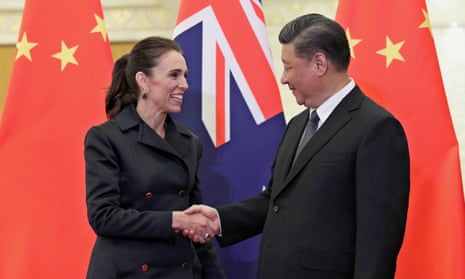After the Biden administration’s announcement concerning the “diplomatic ban” of China’s Winter Games, Jacinda Ardern’s government has distanced itself from western allies once again – but it would be wrong to assume that Wellington has any illusions about China.
The US government confirmed this week it would diplomatically boycott the Winter Olympic Games to protest against China’s persecution of the Uyghur people in the country’s Xinjiang province. Australia, UK and Canada subsequently indicated they would join the boycott.
Meanwhile, Grant Robertson, New Zealand’s deputy prime minister, said the New Zealand government had informed Chinese officials it would not send any ministers to the 2022 Winter Games, but left open the possibility that some diplomats may attend.
Robertson said this decision was due to a “range of factors but mostly to do with Covid” and “human rights issues” in China. However, he believed New Zealand’s position on the games did not amount to a “diplomatic boycott”.
New Zealand had earlier broken ranks by signing the United Nations Olympic Truce – a tradition to ensure conflicts do not affect competition in sport – but none of the Quad members (US, India, Australia and Japan) or partners in the Five Eyes intelligence-sharing networks, namely, Australia, Canada, UK and US, have been willing to sign it.
New Zealand’s stance toward Beijing’s Winter Games is only the latest in a long line of diplomatic efforts under Jacinda Ardern’s leadership to engage with China in a way that is distinguishable from its allies.
For one thing, New Zealand signed a 2017 non-binding cooperation agreement with respect to China’s belt and road initiative (BRI), an option spurned by other western states.
In addition, the government framed its 2018 ban of Huawei on technical grounds and did not rule out Huawei’s future participation in that network if the company took corrective steps.
Moreover, after a successful visit to Beijing by Ardern in April 2019, the two sides agreed to accelerate work on upgrading their 2008 FTA.
And even though New Zealand followed other members of the Five Eyes network in suspending their extradition treaties with Hong Kong in July 2020, it was the last to do so.
The government has been depicted as “soft on China” by some media outlets in the US, UK and Australia.
But while the government has sought to minimise differences with China – New Zealand’s biggest trade partner – it is not the case that Wellington has any illusions about China’s authoritarian system and its growing assertiveness internationally.
Among other things, the Ardern leadership responded to concerns about China’s growing influence by announcing a NZ$714m “Pacific Reset” in March 2018; issued a strategic defence policy statement explicitly identifying China as a threat to the international rules-based order; and passed legislation in late 2019 banning all foreign donations over NZ$50 in an apparent move to limit Chinese influence in domestic politics.
At the same time, the government has repeatedly raised concerns with Beijing about human rights violations in Xinjiang, supported Australia in its spat with China in 2019 over the use of a doctored image to spotlight Australia’s “war crimes” in Afghanistan, and the latest Defence assessment warns New Zealand’s position in the South Pacific is now threatened by a growing Chinese presence that could “fundamentally alter the strategic balance.”
So if New Zealand shares many of the strategic concerns of close allies about China, why does it express them in a more nuanced diplomatic fashion?
In essence, the government does not accept the worldview underpinning the new strategic pact between Australia, the UK and US (Aukus) – that the fate of the Indo-Pacific rests on US-China rivalry and, in particular, on the capacity of America and its closest allies to uphold the “international rules-based order” and counter Chinese forcefulness in the region.
This perspective is seen as exaggerating the ability of great powers in the 21st century to shape and influence a region as large and diverse as the Indo-Pacific.
China and the US find themselves today in an increasingly interconnected world where there is a growing number of problems like Covid-19 that do not respect borders and can only be resolved through concerted international cooperation.
While states like Malaysia, Indonesia and Vietnam remain deeply concerned about China’s assertiveness, it does not mean they see Aukus, an enhanced security arrangement involving three English-speaking states – two of whom have had difficult historical links with the region – as the answer to this problem.
Indeed, Aukus runs the risk of boosting domestic support for Xi Jinping’s China-centric foreign policy at a time when there are growing signs of a power struggle behind the scenes in the ruling Communist party.
In the circumstances, the government clearly believes a measured independent foreign policy, which combines elements of counterbalancing and accommodation in relation to China, remains the best way of maximising New Zealand interests in what is now the world’s most important economic and strategic region.
Robert G Patman is a sesquicentennial distinguished chair and a specialist in international relations at the University of Otago, New Zealand
